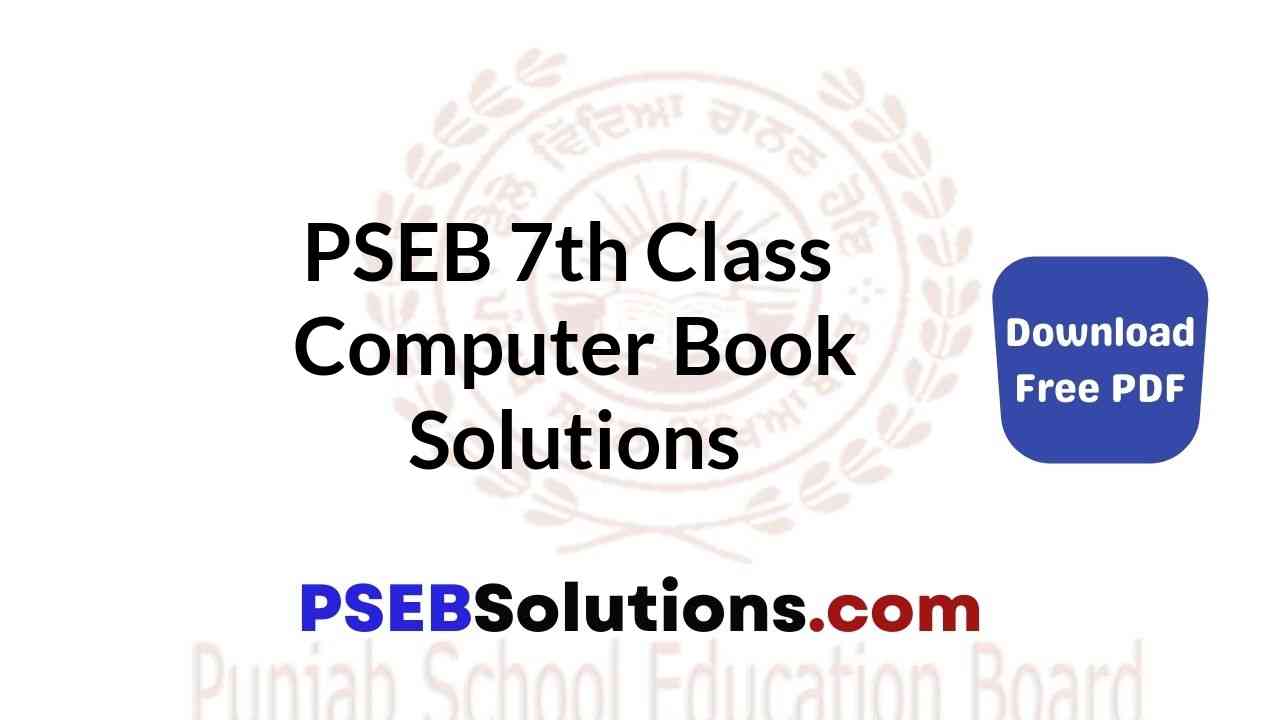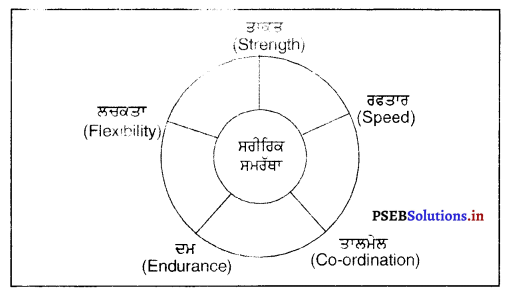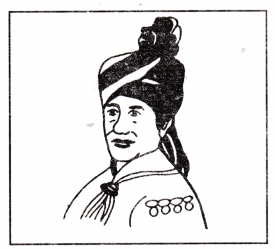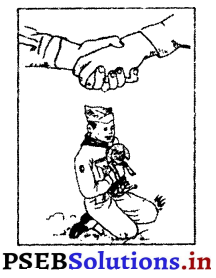Punjab State Board PSEB 7th Class Punjabi Book Solutions Punjabi Rachana ਕਹਾਣੀ-ਰਚਨਾ Textbook Exercise Questions and Answers.
PSEB 7th Class Punjabi Rachana ਕਹਾਣੀ-ਰਚਨਾ
1. ਸਿਆਣਾ ਕਾਂ
ਇਕ ਰਾਜੇ ਦਾ ਬਹੁਤ ਸੋਹਣਾ ਬਾਗ਼ ਸੀ, ਜਿਸਦੇ ਵਿਚਕਾਰ ਇਕ ਵੱਡਾ ਤਲਾਬ ਸੀ । ਰਾਜੇ ਦਾ ਰਾਜਕੁਮਾਰ ਹਰ ਰੋਜ਼ ਬਾਗ਼ ਵਿਚ ਆਉਂਦਾ ਸੀ ਤੇ ਕੁੱਝ ਸਮਾਂ ਸੈਰ-ਸਪਾਟਾ ਕਰਨ ਮਗਰੋਂ ਉਹ ਕੱਪੜੇ ਲਾਹ ਕੇ ਸਰੋਵਰ ਵਿਚ ਇਸ਼ਨਾਨ ਕਰਦਾ ਸੀ ।
ਉਸ ਤਲਾਬ ਤੋਂ ਕੁੱਝ ਦੂਰ ਇਕ ਪੁਰਾਣਾ ਬੋਹੜ ਦਾ ਦਰੱਖ਼ਤ ਸੀ । ਉਸ ਉੱਤੇ ਇਕ ਕਾਂ ਅਤੇ ਕਾਉਣੀ ਰਹਿੰਦੇ ਸਨ । ਬੋਹੜ ਦੀ ਇਕ ਖੋੜ ਵਿਚ ਇਕ ਵੱਡਾ ਸੱਪ ਰਹਿੰਦਾ ਸੀ । ਜਦੋਂ ਵੀ ਕਾਉਣੀ ਆਂਡੇ ਦਿੰਦੀ, ਤਾਂ ਸੱਪ ਅੱਖ ਬਚਾ ਕੇ ਉਨ੍ਹਾਂ ਨੂੰ ਪੀ ਜਾਂਦਾ ਸੀ । ਕਾਂ ਅਤੇ ਕਾਉਣੀ ਇਸ ਤੋਂ ਬਹੁਤ ਦੁਖੀ ਸਨ, ਪਰੰਤੂ ਉਨ੍ਹਾਂ ਨੂੰ ਇਸ ਤੋਂ ਛੁਟਕਾਰਾ ਪਾਉਣ ਦਾ ਕੋਈ ਰਾਹ ਨਹੀਂ ਸੀ ਲੱਭਦਾ ।
ਇਕ ਦਿਨ ਕਾਂ ਨੇ ਇਕ ਤਰੀਕਾ ਸੋਚਿਆ । ਜਦੋਂ ਰਾਜਕੁਮਾਰ ਬਾਗ਼ ਦੀ ਸੈਰ ਕਰਨ ਮਗਰੋਂ ਤਲਾਬ ਵਿਚ ਨੁਹਾਉਣ ਲਈ ਆਇਆ, ਤਾਂ ਉਸ ਨੇ ਆਪਣੇ ਕੱਪੜੇ ਲਾਹ ਕੇ ਤਲਾਬ ਦੇ ਕੰਢੇ ਉੱਤੇ ਰੱਖੇ ਤੇ ਨਾਲ ਹੀ ਆਪਣੇ ਗਲੋਂ ਲਾਹ ਕੇ ਸੋਨੇ ਦਾ ਹਾਰ ਵੀ ਰੱਖ ਦਿੱਤਾ !
ਜਦੋਂ ਰਾਜਕੁਮਾਰ ਨਹਾ ਰਿਹਾ ਸੀ, ਤਾਂ ਕਾਂ ਨੇ ਹਾਰ ਆਪਣੀ ਚੁੰਝ ਵਿਚ ਚੁੱਕ ਲਿਆ ਤੇ ਹੌਲੀ-ਹੌਲੀ ਉੱਡਣਾ ਸ਼ੁਰੂ ਕਰ ਦਿੱਤਾ । ਰਾਜਕੁਮਾਰ ਨੇ ਉਸਨੂੰ ਹਾਰ ਚੁੱਕਦਿਆਂ ਦੇਖ ਲਿਆ ਤੇ ਆਪਣੇ ਸਿਪਾਹੀਆਂ ਨੂੰ ਉਸਦੇ ਮਗਰ ਲਾ ਦਿੱਤਾ । ਕਾਂ ਨੇ ਬੋਹੜ ਦੇ ਦਰੱਖ਼ਤ ਕੋਲ ਪਹੁੰਚ ਕੇ ਹਾਰ ਉਸਦੀ ਖੋੜ੍ਹ ਵਿਚ ਸੁੱਟ ਦਿੱਤਾ । ਸਿਪਾਹੀਆਂ ਨੇ ਡਾਂਗ ਨਾਲ ਖੋੜ੍ਹ ਵਿਚੋਂ ਹਾਰ ਕੱਢਣ ਦੀ ਕੋਸ਼ਿਸ਼ ਕੀਤੀ ।
ਪਰੰਤੂ ਆਪਣੇ ਲਈ ਖ਼ਤਰਾ ਪੈਦਾ ਹੋਇਆ ਦੇਖ ਕੇ ਸੱਪ ਬਾਹਰ ਆ ਗਿਆ । ਸਿਪਾਹੀਆਂ ਨੇ ਸੱਪ ਨੂੰ ਮਾਰ ਦਿੱਤਾ ਤੇ ਹਾਰ ਖੋੜ੍ਹ ਵਿਚੋਂ ਕੱਢ ਲਿਆ । ਰਾਜਕੁਮਾਰ ਹਾਰ ਪ੍ਰਾਪਤ ਕਰਕੇ ਬਹੁਤ ਖ਼ੁਸ਼ ਹੋਇਆ । ਕਾਂ ਤੇ ਕਾਉਣੀ ਇਹ ਸਭ ਕੁੱਝ ਦੇਖ ਰਹੇ ਸਨ । ਉਹ ਸੱਪ ਨੂੰ ਮਰਿਆ ਦੇਖ ਕੇ ਬਹੁਤ ਖੁਸ਼ ਹੋਏ । ਹੁਣ ਉਨ੍ਹਾਂ ਦੇ ਆਂਡਿਆਂ ਨੂੰ ਕੋਈ ਖ਼ਤਰਾ ਨਹੀਂ ਸੀ । ਇਸ ਪ੍ਰਕਾਰ ਕਾਂ ਨੇ ਸਿਆਣਪ ਨਾਲ ਆਪਣੇ ਦੁਸ਼ਮਣ ਨੂੰ ਮਾਰ ਮੁਕਾ ਲਿਆ ਤੇ ਦੋਵੇਂ ਸੁਖੀ-ਸੁਖੀ ਰਹਿਣ ਲੱਗੇ ।
ਸਿੱਖਿਆ : ਮੁਸੀਬਤ ਸਮੇਂ ਸਿਆਣਪ ਹੀ ਕੰਮ ਆਉਂਦੀ ਹੈ ।

2. ਇਮਾਨਦਾਰ ਲੱਕੜਹਾਰਾ
ਜਾਂ
ਇਮਾਨਦਾਰੀ ਦਾ ਫਲ ਮਿੱਠਾ ਹੁੰਦਾ ਹੈ
ਇਕ ਪਿੰਡ ਵਿਚ ਇਕ ਗ਼ਰੀਬ ਲੱਕੜਹਾਰਾ ਰਹਿੰਦਾ ਸੀ । ਉਹ ਬਹੁਤ ਇਮਾਨਦਾਰ ਸੀ । ਉਹ ਹਰ ਰੋਜ਼ ਜੰਗਲ ਵਿਚ ਲੱਕੜਾਂ ਕੱਟਣ ਜਾਂਦਾ ਹੁੰਦਾ ਸੀ। ਇਕ ਦਿਨ ਉਹ ਜੰਗਲ ਵਿਚ ਨਦੀ ਦੇ ਕੰਢੇ ਉੱਤੇ ਪੁੱਜਾ ਅਤੇ ਇਕ ਦਰੱਖ਼ਤ ਨੂੰ ਕੱਟਣ ਲੱਗ ਪਿਆ । ਅਜੇ ਉਸ ਨੇ ਦਰੱਖ਼ਤ ਦੇ ਮੁੱਢ ਵਿਚ ਪੰਜ-ਸੱਤ ਕੁਹਾੜੇ ਹੀ ਮਾਰੇ ਸਨ ਕਿ ਉਸ ਦਾ ਕੁਹਾੜਾ ਹੱਥੋਂ ਛੁੱਟ ਕੇ ਨਦੀ ਵਿਚ ਡਿਗ ਪਿਆ ।
ਨਦੀ ਦਾ ਪਾਣੀ ਬਹੁਤ ਡੂੰਘਾ ਸੀ । ਲੱਕੜਹਾਰੇ ਨੂੰ ਨਾ ਤਰਨਾ ਆਉਂਦਾ ਸੀ ਤੇ ਨਾ ਚੁੱਭੀ ਲਾਉਣੀ । ਉਹ ਬਹੁਤ ਪਰੇਸ਼ਾਨ ਹੋਇਆ, ਪਰ ਕਰ ਕੁੱਝ ਨਹੀਂ ਸੀ ਸਕਦਾ ਉਹ ਬੈਠ ਕੇ ਰੋਣ ਲੱਗ ਪਿਆ । ਇੰਨੇ ਨੂੰ ਪਾਣੀ ਦਾ ਦੇਵਤਾ ਉਸ ਦੇ ਸਾਹਮਣੇ ਪ੍ਰਗਟ ਹੋਇਆ ਅਤੇ ਉਸ ਨੇ ਲੱਕੜਹਾਰੇ ਨੂੰ ਰੋਣ ਦਾ ਕਾਰਨ ਪੁੱਛਿਆ । ਵਿਚਾਰੇ ਲੱਕੜਹਾਰੇ ਨੇ ਉਸ ਨੂੰ ਆਪਣੀ ਸਾਰੀ ਦੁੱਖ ਭਰੀ ਕਹਾਣੀ ਸੁਣਾਈ ।
ਦੇਵਤੇ ਨੇ ਪਾਣੀ ਵਿਚ ਚੁੱਭੀ ਮਾਰੀ ਅਤੇ ਸੋਨੇ ਦਾ ਇਕ ਕੁਹਾੜਾ ਕੱਢ ਲਿਆਂਦਾ ।ਲੱਕੜ੍ਹਾਰੇ ਨੇ ਕਿਹਾ ਕਿ ਇਹ ਉਸ ਦਾ ਕੁਹਾੜਾ ਨਹੀਂ, ਇਸ ਕਰਕੇ ਉਹ ਇਹ ਨਹੀਂ ਲਵੇਗਾ । ਦੇਵਤੇ ਨੇ ਫਿਰ ਪਾਣੀ ਵਿਚ ਚੁੱਭੀ ਮਾਰੀ ਤੇ ਚਾਂਦੀ ਦਾ ਇਕ ਕੁਹਾੜਾ ਕੱਢ ਲਿਆਂਦਾ । ਲੱਕੜਹਾਰੇ ਨੇ ਕਿਹਾ ਕਿ ਇਹ ਵੀ ਉਸ ਦਾ ਕੁਹਾੜਾ ਨਹੀਂ ; ਉਸ ਦਾ ਕੁਹਾੜਾ ਲੋਹੇ ਦਾ ਹੈ ; ਇਸ ਕਰਕੇ ਉਹ ਚਾਂਦੀ ਦਾ ਕੁਹਾੜਾ ਨਹੀਂ ਲਵੇਗਾ । ਇਸ ਪਿੱਛੋਂ ਦੇਵਤੇ ਨੇ ਤੀਜੀ ਵਾਰੀ ਚੁੱਭੀ ਮਾਰੀ ਅਤੇ ਲੋਹੇ ਦਾ ਕੁਹਾੜਾ ਕੱਢ ਲਿਆਂਦਾ । ਲੱਕੜਹਾਰਾ ਆਪਣਾ ਕੁਹਾੜਾ ਦੇਖ ਕੇ ਬਹੁਤ ਖ਼ੁਸ਼ ਹੋਇਆ ਤੇ ਕਹਿਣ ਲੱਗਾ, “ਇਹ ਹੀ ਮੇਰਾ ਕੁਹਾੜਾ ਹੈ । ਮੈਨੂੰ ਇਹ ਦੇ ਦੇਵੋ ।” ਲੱਕੜਹਾਰੇ ਦੀ ਇਮਾਨਦਾਰੀ ਨੂੰ ਦੇਖ ਕੇ ਪਾਣੀ ਦਾ ਦੇਵਤਾ ਬਹੁਤ ਖੁਸ਼ ਹੋਇਆ ਅਤੇ ਉਸ ਨੇ ਲੱਕੜਹਾਰੇ ਨੂੰ ਬਾਕੀ ਦੋਨੋਂ ਕੁਹਾੜੇ ਵੀ ਇਨਾਮ ਵਜੋਂ ਦੇ ਦਿੱਤੇ ।
ਸਿੱਖਿਆ : ਇਮਾਨਦਾਰੀ ਦਾ ਫਲ ਮਿੱਠਾ ਹੁੰਦਾ ਹੈ ।
3. ਸ਼ੇਰ ਅਤੇ ਚੂਹੀ
ਇਕ ਦਿਨ ਬਹੁਤ ਗਰਮੀ ਸੀ । ਇਕ ਸ਼ੇਰ ਇਕ ਦਰੱਖ਼ਤ ਦੀ ਛਾਂ ਹੇਠ ਸੁੱਤਾ ਪਿਆ ਸੀ । ਨੇੜੇ ਹੀ ਇਕ ਖੁੱਡ ਵਿਚ ਇਕ ਚੂਹੀ ਰਹਿੰਦੀ ਸੀ । ਚੂਹੀ ਆਪਣੀ ਖੁੱਡ ਵਿਚੋਂ ਬਾਹਰ ਨਿਕਲੀ ਅਤੇ ਸ਼ੇਰ ਦੇ ਉੱਪਰ ਚੜ੍ਹ ਕੇ ਟੱਪਣ ਲੱਗੀ । ਸ਼ੇਰ ਨੂੰ ਜਾਗ ਆ ਗਈ । ਉਸ ਨੂੰ ਬਹੁਤ ਗੁੱਸਾ ਆਇਆ । ਉਸ ਨੇ ਚੂਹੀ ਨੂੰ ਆਪਣੇ ਪੰਜੇ ਵਿਚ ਫੜ ਲਿਆ । ਉਹ ਚੂਹੀ ਨੂੰ ਮਾਰਨ ਹੀ ਲੱਗਾ ਸੀ ਕਿ ਚੂਹੀ ਨੇ ਕਿਹਾ, “ਕਿਰਪਾ ਕਰ ਕੇ ਮੇਰੇ ਤੇ ਰਹਿਮ ਕਰੋ, ਮੈਥੋਂ ਭੁੱਲ ਹੋ ਗਈ ਹੈ । ਕਦੇ ਸਮਾਂ ਆਇਆ, ਤਾਂ ਮੈਂ ਤੁਹਾਡੀ ਮਿਹਰਬਾਨੀ ਦਾ ਬਦਲਾ ਚੁਕਾਵਾਂਗੀ ।” ਸ਼ੇਰ ਨੇ ਉਸ ਉੱਤੇ ਤਰਸ ਖਾਧਾ ਅਤੇ ਉਸ ਨੂੰ ਛੱਡ ਦਿੱਤਾ ।
ਕਝ ਦਿਨਾਂ ਮਗਰੋਂ ਇਕ ਸ਼ਿਕਾਰੀ ਨੇ ਸ਼ੇਰ ਨੂੰ ਆਪਣੇ ਜਾਲ ਵਿਚ ਫਸਾ ਲਿਆ । ਸ਼ੇਰ ਨੇ ਜਾਲ ਵਿਚੋਂ ਨਿਕਲਣ ਲਈ ਬਹੁਤ ਹੱਥ-ਪੈਰ ਮਾਰੇ, ਪਰ ਵਿਅਰਥ । ਉਹ ਦੁੱਖ ਨਾਲ ਗਰਜਣ ਲੱਗਾ । ਉਸ ਦੀ ਅਵਾਜ਼ ਚੂਹੀ ਦੇ ਕੰਨੀਂ ਪਈ ।
ਚੂਹੀ ਆਪਣੀ ਖੁੱਡ ਵਿਚੋਂ ਬਾਹਰ ਨਿਕਲੀ । ਉਸ ਨੇ ਜਾਲ ਦੀਆਂ ਰੱਸੀਆਂ ਨੂੰ ਟੁੱਕਣਾ ਸ਼ੁਰੂ ਕਰ ਦਿੱਤਾ । ਜਲਦੀ ਹੀ ਸ਼ੇਰ ਜਾਲ ਵਿਚੋਂ ਬਾਹਰ ਨਿਕਲ ਆਇਆ । ਉਸ ਨੇ ਚੂਹੀ ਦਾ ਬਹੁਤ ਧੰਨਵਾਦ ਕੀਤਾ ।
ਸਿੱਟਾ : ਅੰਤ ਭਲੇ ਦਾ ਭਲਾ ।

4. ਏਕਤਾ ਵਿਚ ਬਲ ਹੈ।
ਜਾਂ
ਕਿਸਾਨ ਅਤੇ ਉਸ ਦੇ ਪੁੱਤਰ
ਇਕ ਵਾਰੀ ਦੀ ਗੱਲ ਹੈ ਕਿ ਕਿਸੇ ਥਾਂ ਇਕ ਬੁੱਢਾ ਕਿਸਾਨ ਰਹਿੰਦਾ ਸੀ । ਉਸ ਦੇ ਚਾਰ ਪੁੱਤਰ ਸਨ । ਉਹ ਹਮੇਸ਼ਾ ਆਪਸ ਵਿਚ ਲੜਦੇ ਰਹਿੰਦੇ ਸਨ । ਕਿਸਾਨ ਨੇ ਉਨ੍ਹਾਂ ਨੂੰ ਬਹੁਤ ਵਾਰੀ ਸਮਝਾਇਆ ਸੀ ਕਿ ਉਹ ਪਿਆਰ ਅਤੇ ਏਕਤਾ ਨਾਲ ਰਿਹਾ ਕਰਨ, ਪਰ ਉਨ੍ਹਾਂ ਉੱਪਰ ਪਿਤਾ ਦੀਆਂ ਨਸੀਹਤਾਂ ਦਾ ਕੋਈ ਅਸਰ ਨਹੀਂ ਸੀ ਹੁੰਦਾ ।
ਇਕ ਵਾਰੀ ਉਹ ਬੁੱਢਾ ਕਿਸਾਨ ਬਿਮਾਰ ਹੋ ਗਿਆ । ਉਸ ਨੂੰ ਆਪਣੇ ਪੁੱਤਰਾਂ ਵਿਚਕਾਰ ਲੜਾਈ-ਝਗੜੇ ਦਾ ਬਹੁਤ ਫ਼ਿਕਰ ਰਹਿੰਦਾ ਸੀ । ਉਸ ਨੇ ਉਨ੍ਹਾਂ ਨੂੰ ਸਮਝਾਉਣ ਲਈ ਆਪਣੀ ਸਮਝ ਨਾਲ ਇਕ ਢੰਗ ਕੱਢਿਆ । ਉਸ ਨੇ ਪਤਲੀਆਂ-ਪਤਲੀਆਂ ਲੱਕੜਾਂ ਦਾ ਇਕ ਬੰਡਲ ਮੰਗਾਇਆ । ਉਸ ਨੇ ਬੰਡਲ ਵਿਚੋਂ ਇਕ-ਇਕ ਸੋਟੀ ਕੱਢ ਕੇ ਆਪਣੇ ਪੁੱਤਰਾਂ ਨੂੰ ਦਿੱਤੀ ਤੇ ਉਨ੍ਹਾਂ ਨੂੰ ਤੋੜਨ ਲਈ ਕਿਹਾ । ਚੌਹਾਂ ਪੁੱਤਰਾਂ ਨੇ ਇਕ-ਇਕ ਲੱਕੜੀ ਬੜੀ ਸੌਖ ਨਾਲ ਤੋੜ ਦਿੱਤੀ । ਫਿਰ ਕਿਸਾਨ ਨੇ ਸਾਰਾ ਬੰਡਲ ਘੁੱਟ ਕੇ ਬੰਨ੍ਹਿਆ ਤੇ ਉਨ੍ਹਾਂ ਨੂੰ ਦੇ ਕੇ ਕਿਹਾ ਕਿ ਇਕੱਲਾ-ਇਕੱਲਾ ਇਸ ਸਾਰੇ ਬੰਡਲ ਨੂੰ ਤੋੜੇ । ਕੋਈ ਵੀ ਪੁੱਤਰ ਉਸ ਬੰਨ੍ਹੇ ਹੋਏ ਬੰਡਲ ਨੂੰ ਨਾ ਤੋੜ ਸਕਿਆ । ਕਿਸਾਨ ਨੇ ਪੁੱਤਰਾਂ ਨੂੰ ਸਿੱਖਿਆ ਦਿੱਤੀ ਕਿ ਉਹ ਇਨ੍ਹਾਂ ਪਤਲੀਆਂਪਤਲੀਆਂ ਲੱਕੜੀਆਂ ਤੋਂ ਸਿੱਖਿਆ ਲੈਣ ਉਨ੍ਹਾਂ ਨੂੰ ਲੜਾਈ-ਝਗੜਾ ਕਰ ਕੇ ਇਕੱਲੇ-ਇਕੱਲੇ ਰਹਿਣ ਦੀ ਥਾਂ ਮਿਲ ਕੇ ਰਹਿਣਾ ਚਾਹੀਦਾ ਹੈ । ਇਸ ਤਰ੍ਹਾਂ ਉਨ੍ਹਾਂ ਦੀ ਤਾਕਤ ਬਹੁਤ ਹੋਵੇਗੀ । ਇਹ ਸੁਣ ਕੇ ਪੁੱਤਰਾਂ ਨੇ ਪਿਤਾ ਨੂੰ ਰਲ-ਮਿਲ ਕੇ ਰਹਿਣ ਦਾ ਵਚਨ ਦਿੱਤਾ । ਸਿੱਖਿਆ-ਏਕਤਾ ਵਿਚ ਬਲ ਹੈ ।
5. ਤਿਹਾਇਆ ਕਾਂ
ਇਕ ਵਾਰੀ ਇਕ ਕਾਂ ਨੂੰ ਬਹੁਤ ਤੇਹ ਲੱਗੀ । ਉਹ ਪਾਣੀ ਦੀ ਭਾਲ ਵਿਚ ਇਧਰ-ਉਧਰ ਉੱਡਿਆ । ਅੰਤ ਉਹ ਇਕ ਬਗੀਚੇ ਵਿਚ ਪੁੱਜਾ । ਉਸ ਨੇ ਪਾਣੀ ਦਾ ਇਕ ਘੜਾ ਦੇਖਿਆ । ਉਹ ਘੜੇ ਦੇ ਮੂੰਹ ਉੱਤੇ ਜਾ ਬੈਠਾ । ਉਸ ਨੇ ਦੇਖਿਆ ਕਿ ਘੜੇ ਵਿਚ ਪਾਣੀ ਥੋੜ੍ਹਾ ਹੈ । ਉਸ ਦੀ ਚੁੰਝ ਪਾਣੀ ਤਕ ਨਹੀਂ ਸੀ ਪਹੁੰਚਦੀ । ਉਸ ਨੇ ਘੜੇ ਨੂੰ ਉਲਟਾਉਣ ਦੀ ਕੋਸ਼ਿਸ਼ ਕੀਤੀ, ਪਰ ਉਹ ਅਸਫਲ ਰਿਹਾ ।
ਉਹ ਕਾਂ ਬਹੁਤ ਸਿਆਣਾ ਸੀ । ਉਸ ਨੇ ਘੜੇ ਦੇ ਨੇੜੇ ਕੁੱਝ ਰੋੜੇ ਤੇ ਠੀਕਰੀਆਂ ਦੇਖੀਆਂ । ਉਸ ਨੂੰ ਇਕ ਢੰਗ ਸੁੱਝਿਆ । ਉਸ ਨੇ ਠੀਕਰੀਆਂ ਤੇ ਰੋੜੇ ਚੁੱਕ ਕੇ ਘੜੇ ਵਿਚ ਪਾਉਣੇ ਸ਼ੁਰੂ ਕਰ ਦਿੱਤੇ । ਹੌਲੀ-ਹੌਲੀ ਘੜਾ ਰੋੜਿਆਂ ਅਤੇ ਠੀਕਰੀਆਂ ਨਾਲ ਭਰਨ ਲੱਗਾ ਤੇ ਉਸ ਵਿਚਲਾ ਪਾਣੀ ਉੱਪਰ ਆ ਗਿਆ । ਕਾਂ ਨੇ ਰੱਜ ਕੇ ਪਾਣੀ ਪੀਤਾ ਅਤੇ ਉੱਡ ਗਿਆ ।
ਸਿੱਖਿਆ : ਜਿੱਥੇ ਚਾਹ ਉੱਥੇ ਰਾਹ ।
6. ਲੇਲਾ ਤੇ ਬਘਿਆੜ
ਇਕ ਵਾਰੀ ਇਕ ਬਘਿਆੜ ਇਕ ਨਦੀ ਦੇ ਕੰਢੇ ਉੱਤੇ ਪਾਣੀ ਪੀ ਰਿਹਾ ਸੀ । ਦੂਜੇ ਪਾਸੇ ਨਿਵਾਣ ਵਲ ਉਸ ਨੇ ਇਕ ਲੇਲੇ ਨੂੰ ਪਾਣੀ ਪੀਂਦਿਆਂ ਦੇਖਿਆ। ਉਸ ਦਾ ਦਿਲ ਕੀਤਾ ਕਿ ਉਹ ਲੇਲੇ ਨੂੰ ਮਾਰ ਕੇ ਖਾ ਲਵੇ । ਉਹ ਮਨ ਵਿਚ ਉਸ ਨੂੰ ਖਾਣ ਦੇ ਬਹਾਨੇ ਸੋਚਣ ਲੱਗਾ । ਉਸਨੇ ਲੇਲੇ ਨੂੰ ਗੁੱਸੇ ਨਾਲ ਕਿਹਾ ਕਿ ਉਹ ਉਸ ਦੇ ਪੀਣ ਵਾਲੇ ਪਾਣੀ ਨੂੰ ਗੰਧਲਾ ਕਿਉਂ ਕਰ ਰਿਹਾ ਹੈ । ਲੇਲੇ ਨੇ ਡਰ ਕੇ ਨਿਮਰਤਾ ਨਾਲ ਕਿਹਾ, “ਮਹਾਰਾਜਾ ਪਾਣੀ ਤਾਂ ਤੁਹਾਡੇ ਵਲੋਂ ਮੇਰੀ ਵਲ ਆ ਰਿਹਾ ਹੈ । ਇਸ ਕਰਕੇ ਮੈਂ ਤੁਹਾਡੇ ਪੀਣ ਵਾਲੇ ਪਾਣੀ ਨੂੰ ਗੰਧਲਾ ਕਿਸ ਤਰ੍ਹਾਂ ਕਰ ਸਕਦਾ ਹਾਂ।”
ਬਘਿਆੜ ਨਿੱਠ ਜਿਹਾ ਹੋ ਗਿਆ, ਪਰ ਉਹ ਲੇਲੇ ਨੂੰ ਹੱਥੋਂ ਨਹੀਂ ਸੀ ਜਾਣ ਦੇਣਾ ਚਾਹੁੰਦਾ । ਉਸ ਨੇ ਉਸ ਨੂੰ ਕਿਹਾ, “ਤੂੰ ਮੈਨੂੰ ਪਿਛਲੇ ਸਾਲ ਗਾਲਾਂ ਕਿਉਂ ਕੱਢੀਆਂ ਸਨ ?” ਲੇਲੇ ਨੇ ਫਿਰ ਨਿਮਰਤਾ ਨਾਲ ਕਿਹਾ, “ਮਹਾਰਾਜ, ਪਿਛਲੇ ਸਾਲ ਤਾਂ ਮੈਂ ਜੰਮਿਆਂ ਵੀ ਨਹੀਂ ਸੀ।” ਹੁਣ ਬਘਿਆੜ ਕੋਲ ਚਾਰਾ ਨਾ ਰਿਹਾ ਤੇ ਗੁੱਸੇ ਨਾਲ ਕਹਿਣ ਲੱਗਾ, “ਜੇਕਰ ਉਦੋਂ ਤੂੰ ਨਹੀਂ ਸੀ, ਤਾਂ ਤੇਰਾ ਪਿਓ-ਦਾਦਾ ਹੋਵੇਗਾ । ਇਸ ਕਰਕੇ ਤੂੰ ਕਸੂਰਵਾਰ ਹੈਂ ।” ਇਹ ਕਹਿ ਕੇ ਉਸ ਨੇ ਝਪੱਟਾ ਮਾਰਿਆ ਤੇ ਉਸ ਨੂੰ ਪਾੜ ਕੇ ਖਾ ਗਿਆ ।
ਸਿੱਖਿਆ : ਡਾਢੇ ਦਾ ਸੱਤੀਂ ਵੀਹੀਂ ਸੌ ।
ਜਾਂ
ਜ਼ੁਲਮ ਕਰਨ ਵਾਲਾ ਕੋਈ ਨਾ ਕੋਈ ਬਹਾਨਾ ਲੱਭ ਹੀ ਲੈਂਦਾ ਹੈ ।

7. ਕਾਂ ਅਤੇ ਲੂੰਬੜੀ
ਜਾਂ
ਚਲਾਕ ਲੂੰਬੜੀ
ਇਕ ਵਾਰੀ ਇਕ ਲੂੰਬੜੀ ਨੂੰ ਬਹੁਤ ਭੁੱਖ ਲੱਗੀ । ਉਹ ਕੋਈ ਖਾਣ ਵਾਲੀ ਚੀਜ਼ ਲੱਭਣ ਲਈ ਇਧਰ-ਉਧਰ ਘੁੰਮੀ, ਪਰ ਉਸ ਨੂੰ ਕੁੱਝ ਨਾ ਮਿਲਿਆ । ਅੰਤ ਉਹ ਦਰੱਖ਼ਤਾਂ ਦੇ ਇਕ ਝੁੰਡ ਹੇਠ ਪਹੁੰਚੀ । ਉਹ ਬਹੁਤ ਥੱਕੀ ਹੋਈ ਸੀ ਤੇ ਉਹ ਦਰੱਖ਼ਤਾਂ ਦੀ ਸੰਘਣੀ ਛਾਂ ਹੇਠਾਂ ਲੰਮੀ ਪੈ ਗਈ ।
ਇੰਨੇ ਨੂੰ ਲੂੰਬੜੀ ਨੇ ਉੱਪਰ ਵਲ ਧਿਆਨ ਮਾਰਿਆ । ਦਰੱਖ਼ਤ ਦੀ ਇਕ ਟਹਿਣੀ ਉੱਤੇ ਉਸ ਨੇ ਇਕ ਕਾਂ ਦੇਖਿਆ, ਜਿਸ ਦੀ ਚੁੰਝ ਵਿਚ ਪਨੀਰ ਦਾ ਇਕ ਟੁਕੜਾ ਸੀ । ਇਹ ਦੇਖ ਕੇ ਉਸ ਦੇ ਮੂੰਹ ਵਿਚ ਪਾਣੀ ਭਰ ਆਇਆ । ਉਸ ਨੇ ਕਾਂ ਕੋਲੋਂ ਪਨੀਰ ਦਾ ਟੁਕੜਾ ਖੋਹਣ ਦਾ ਇਕ ਢੰਗ ਕੱਢ ਲਿਆ ।
ਉਸ ਨੇ ਬੜੀ ਚਾਲਾਕੀ ਤੇ ਪਿਆਰ ਭਰੀ ਅਵਾਜ਼ ਨਾਲ ਕਾਂ ਨੂੰ ਕਿਹਾ, “ਬਹੁਤ ਹੀ ਮਨਮੋਹਣਾ ਪੰਛੀ ਹੈਂ । ਤੇਰੀ ਅਵਾਜ਼ ਬਹੁਤ ਹੀ ਸੁਰੀਲੀ ਹੈ । ਮੇਰਾ ਜੀ ਕਰਦਾ ਹੈ ਕਿ ਤੇਰਾ ਇਕ ਮਿੱਠਾ ਗੀਤ ਸੁਣਾਂ । ਕਿਰਪਾ ਕਰ ਕੇ ਮੈਨੂੰ ਗਾ ਕੇ ਸੁਣਾ ।” ਕਾਂ ਲੂੰਬੜੀ ਦੀ ਖ਼ੁਸ਼ਾਮਦ ਵਿਚ ਆ ਕੇ ਖ਼ੁਸ਼ੀ ਨਾਲ ਫੁੱਲ ਗਿਆ । ਜਿਉਂ ਹੀ ਉਸ ਨੇ ਗਾਉਣ ਲਈ ਮੂੰਹ ਖੋਲ੍ਹਿਆ, ਤਾਂ ਪਨੀਰ ਦਾ ਟੁਕੜਾ ਉਸ ਦੇ ਮੂੰਹ ਵਿਚੋਂ ਹੇਠਾਂ ਡਿਗ ਪਿਆ । ਲੂੰਬੜੀ ਪਨੀਰ ਦੇ ਟੁਕੜੇ ਨੂੰ ਝੱਟ-ਪੱਟ ਖਾ ਕੇ ਆਪਣੇ ਰਾਹ ਤੁਰਦੀ ਬਣੀ ਤੇ ਕਾਂ ਉਸ਼ ਵਲ ਦੇਖਦਾ ਹੀ ਰਹਿ ਗਿਆ ।
ਸਿੱਖਿਆ : ਖ਼ੁਸ਼ਾਮਦ ਤੋਂ ਬਚੋ ।
8. ਦਰਜ਼ੀ ਅਤੇ ਹਾਥੀ
ਇਕ ਰਾਜੇ ਕੋਲ ਇਕ ਹਾਥੀ ਸੀ । ਹਾਥੀ ਹਰ ਰੋਜ਼ ਨਦੀ ਵਿਚ ਨਹਾਉਣ ਲਈ ਜਾਂਦਾ ਹੁੰਦਾ ਸੀ । ਦਰਿਆ ਦੇ ਰਸਤੇ ਵਿਚ ਇਕ ਬਜ਼ਾਰ ਆਉਂਦਾ ਸੀ । ਬਜ਼ਾਰ ਵਿਚ ਇਕ ਦਰਜ਼ੀ ਦੀ ਦੁਕਾਨ ਸੀ । ਦਰਿਆ ਨੂੰ ਜਾਂਦਾ ਹੋਇਆ ਹਾਥੀ ਹਰ ਰੋਜ਼ ਦਰਜ਼ੀ ਦੀ ਦੁਕਾਨ ਕੋਲ ਰੁਕ ਜਾਂਦਾ ਸੀ । ਦਰਜ਼ੀ ਇਕ ਨਰਮ ਦਿਲ ਆਦਮੀ ਸੀ । ਉਹ ਹਰ ਰੋਜ਼ ਹਾਥੀ ਨੂੰ ਕੋਈ ਨਾ ਕੋਈ ਚੀਜ਼ ਖਾਣ ਨੂੰ ਦਿੰਦਾ । ਇਸ ਤਰ੍ਹਾਂ ਹਾਥੀ ਅਤੇ ਦਰਜ਼ੀ ਆਪਸ ਵਿਚ ਮਿੱਤਰ ਬਣ ਗਏ ।
ਇਕ ਦਿਨ ਦਰਜ਼ੀ ਘਰੋਂ ਆਪਣੀ ਪਤਨੀ ਨਾਲ ਲੜ ਕੇ ਆਇਆ ਸੀ । ਉਸ ਦਾ ਮਨ ਗੁੱਸੇ ਨਾਲ ਭਰਿਆ ਹੋਇਆ ਸੀ । ਇਸੇ ਵੇਲੇ ਹਾਥੀ ਵੀ ਉੱਥੇ ਆ ਗਿਆ । ਉਸ ਨੇ ਆਪਣੀ ਸੁੰਡ, ਦੁਕਾਨ ਦੇ ਅੰਦਰ ਕੀਤੀ । ਦਰਜ਼ੀ ਨੇ ਉਸ ਨੂੰ ਕੁੱਝ ਵੀ ਖਾਣ ਲਈ ਨਾ ਦਿੱਤਾ, ਸਗੋਂ ਉਸ ਦੀ ਸੁੰਡ ਵਿਚ ਸੂਈ ਚੋਭ ਦਿੱਤੀ ।
ਹਾਥੀ ਨੂੰ ਦਰਜ਼ੀ ਦੀ ਇਸ ਕਰਤੂਤ ‘ਤੇ ਬਹੁਤ ਗੁੱਸਾ ਆਇਆ । ਉਹ ਦਰਿਆ ‘ਤੇ ਪੁੱਜਾ । ਉਸ ਨੇ ਆਪਣੀ ਸੁੰਡ ਵਿਚ ਚਿੱਕੜ ਵਾਲਾ ਪਾਣੀ ਭਰ ਲਿਆ ! ਵਾਪਸੀ ‘ਤੇ ਉਸ ਨੇ ਸਾਰਾ ਚਿੱਕੜ ਲਿਆ ਕੇ ਦਰਜ਼ੀ ਦੀ ਦੁਕਾਨ ਵਿਚ ਸੁੱਟ ਦਿੱਤਾ । ਦਰਜ਼ੀ ਦੇ ਸਾਰੇ ਕੱਪੜੇ ਖ਼ਰਾਬ ਹੋ ਗਏ । ਉਹ ਡਰਦਾ ਦੁਕਾਨ ਛੱਡ ਕੇ ਦੌੜ ਗਿਆ । ਇਸ ਤਰ੍ਹਾਂ ਹਾਥੀ ਨੇ ਆਪਣਾ ਬਦਲਾ ਲੈ ਲਿਆ ।
ਸਿੱਟਾ : ਜਿਹਾ ਕਰੋਗੇ ਤਿਹਾ ਭਰੋਗੇ ।

9. ਆਜੜੀ ਅਤੇ ਬਘਿਆੜ
ਇਕ ਆਜੜੀ ਮੁੰਡਾ ਸੀ । ਉਹ ਆਪਣੇ ਪਿੰਡ ਤੋਂ ਬਾਹਰ ਜੰਗਲ ਵਿਚ ਭੇਡਾਂ ਚਾਰਨ ਜਾਂਦਾ ਹੁੰਦਾ ਸੀ । ਇਕ ਦਿਨ ਉਸ ਨੇ ਲੋਕਾਂ ਦਾ ਮਖੌਲ ਉਡਾਉਣਾ ਚਾਹਿਆ ।ਉਹ ਇਕ ਉੱਚੇ ਦਰੱਖ਼ਤ ਉੱਤੇ ਚੜ੍ਹ ਗਿਆ ਅਤੇ ਉੱਚੀ-ਉੱਚੀ ਰੌਲਾ ਪਾਉਣ ਲੱਗਾ, “ਬਘਿਆੜ ! ਬਘਿਆੜ ! ਮੈਨੂੰ ਬਚਾਓ ।” ਪਿੰਡ ਦੇ ਲੋਕਾਂ ਨੇ ਉਸ ਦੀਆਂ ਚੀਕਾਂ ਸੁਣੀਆਂ । ਉਹ ਆਪਣੇ ਕੰਮ-ਕਾਰ ਛੱਡ ਕੇ ਤੇ ਡਾਂਗਾਂ ਚੁੱਕ ਕੇ ਉਸ ਦੀ ਮੱਦਦ ਲਈ ਦੌੜੇ ਆਏ । ਜਦੋਂ ਉਹ ਉੱਥੇ ਪਹੁੰਚੇ, ਤਾਂ ਆਜੜੀ ਮੁੰਡਾ ਅੱਗੋਂ ਹੱਸਣ ਲੱਗ ਪਿਆ । ਉਨ੍ਹਾਂ ਨੇ ਪੁੱਛਿਆ, ‘ਬਘਿਆੜ ਕਿੱਥੇ ਹੈ ? ਆਜੜੀ ਮੁੰਡੇ ਨੇ ਉੱਤਰ ਦਿੱਤਾ ਕਿ ਉਸ ਨੇ ਸਿਰਫ਼ ਉਨ੍ਹਾਂ ਨਾਲ ਮਖੌਲ ਹੀ ਕੀਤਾ ਹੈ, ਬਘਿਆੜ ਕੋਈ ਨਹੀਂ ਆਇਆ । ਲੋਕਾਂ ਨੂੰ ਉਸ ਦੀ ਇਸ ਗੱਲ ‘ਤੇ ਬੜਾ ਗੁੱਸਾ ਆਇਆ । ਉਹ ਭਰੇ-ਪੀਤੇ ਵਾਪਸ ਮੁੜ ਗਏ ।
ਅਗਲੇ ਦਿਨ ਆਜੜੀ ਮੁੰਡਾ ਜਦੋਂ ਭੇਡਾਂ ਚਾਰ ਰਿਹਾ ਸੀ, ਤਾਂ ਬਆੜ ਸੱਚ-ਮੁੱਚ ਹੀ ਆ ਗਿਆ । ਉਹ ਉਸ ਦੀਆਂ ਭੇਡਾਂ ਨੂੰ ਮਾਰ-ਮਾਰ ਕੇ ਖਾਣ ਲੱਗਾ । ਮੁੰਡੇ ਨੇ ਬਹੁਤ ਰੌਲਾ ਪਾਇਆ । ਪਿੰਡ ਦੇ ਲੋਕਾਂ ਨੇ ਉਸ ਦੀਆਂ ਚੀਕਾਂ ਸੁਣੀਆਂ, ਪਰ ਕੋਈ ਵੀ ਉਸ ਦੀ ਮੱਦਦ ਲਈ ਨਾ ਆਇਆ । ਬਘਿਆੜ ਨੇ ਮੁੰਡੇ ਉੱਤੇ ਝਪਟਾ ਮਾਰਿਆ ਤੇ ਉਸ ਨੂੰ ਵੀ ਮਾਰ ਕੇ ਸੁੱਟ ਦਿੱਤਾ । ਇਸ ਤਰ੍ਹਾਂ ਇਕ ਵਾਰ ਝੂਠ ਬੋਲਣ ਕਰਕੇ ਉਸ ਮੁੰਡੇ ਨੇ ਆਪਣੀ ਜਾਨ ਗੁਆ ਲਈ । ਸੱਚ ਹੈ, ਝੂਠੇ ‘ਤੇ ਕੋਈ ਇਤਬਾਰ ਨਹੀਂ ਕਰਦਾ ।
ਸਿੱਖਿਆ : ਝੂਠੇ ‘ਤੇ ਕੋਈ ਇਤਬਾਰ ਨਹੀਂ ਕਰਦਾ ।
10. ਬੁਰੀ ਸੰਗਤ
ਇਕ ਅਮੀਰ ਆਦਮੀ ਦਾ ਪੁੱਤਰ ਬੁਰੀ ਸੰਗਤ ਵਿਚ ਪੈ ਗਿਆ । ਉਸ ਨੂੰ ਆਪਣੇ ਪੁੱਤਰ ਦੀ ਇਸ ਆਦਤ ਦਾ ਬਹੁਤ ਦੁੱਖ ਹੋਇਆ । ਉਸ ਨੇ ਆਪਣੇ ਪੁੱਤਰ ਨੂੰ ਬਹੁਤ ਸਮਝਾਇਆ ਕਿ ਉਹ ਬੁਰੀ ਸੰਗਤ ਛੱਡ ਦੇਵੇ, ਪਰ ਪੁੱਤਰ ਉੱਤੇ ਕੋਈ ਅਸਰ ਨਾ ਹੋਇਆ । ਅੰਤ ਉਸ ਨੇ । ਉਸ ਨੂੰ ਸਿੱਧੇ ਰਾਹ ਪਾਉਣ ਲਈ ਇਕ ਤਰੀਕਾ ਕੱਢਿਆ ।
ਉਸ ਨੇ ਬਜ਼ਾਰੋਂ ਵਧੀਆ ਸੇਬਾਂ ਦੀ ਇਕ ਟੋਕਰੀ ਮੰਗਵਾਈ ਅਤੇ ਨਾਲ ਹੀ ਇਕ ਗਲਿਆ । ਸੜਿਆ ਸੇਬ ਮੰਗਵਾ ਲਿਆ । ਉਸ ਨੇ ਆਪਣੇ ਪੁੱਤਰ ਨੂੰ ਕਿਹਾ ਕਿ ਉਹ ਗਲੇ-ਸੜੇ ਸੇਬ ਨੂੰ । ਬਾਕੀ ਚੰਗੇ ਸੇਬਾਂ ਦੇ ਵਿਚਕਾਰ ਰੱਖ ਦੇਵੇ । ਪੁੱਤਰ ਨੇ ਇਸੇ ਤਰ੍ਹਾਂ ਹੀ ਕੀਤਾ ਅਤੇ ਫੇਰ ਪਿਤਾ ਦੇ ਕਹੇ ਅਨੁਸਾਰ ਉਸ ਨੇ ਉਹ ਟੋਕਰੀ ਅਲਮਾਰੀ ਵਿਚ ਰੱਖ ਦਿੱਤੀ ।
ਅਗਲੇ ਦਿਨ ਪਿਤਾ ਨੇ ਪੁੱਤਰ ਨੂੰ ਕਿਹਾ ਕਿ ਉਹ ਟੋਕਰੀ ਵਿਚੋਂ ਇਕ ਸੇਬ ਲਿਆਵੇ । ਪੁੱਤਰ ਨੇ ਅਲਮਾਰੀ ਖੋਲ੍ਹੀ । ਜਦੋਂ ਉਸ ਨੇ ਟੋਕਰੀ ਚੁੱਕੀ, ਤਾਂ ਦੇਖਿਆ ਕਿ ਉਸ ਵਿਚ ਸਾਰੇ ਸੇਬ ਖ਼ਰਾਬ ਹੋ ਚੁੱਕੇ ਸਨ । ਉਹ ਟੋਕਰੀ ਆਪਣੇ ਪਿਤਾ ਕੋਲ ਚੁੱਕ ਲਿਆਇਆ ਤੇ ਕਹਿਣ ਲੱਗਾ ਕਿ ਸਾਰੇ ਸੇਬ ਖ਼ਰਾਬ ਹੋ ਚੁੱਕੇ ਸਨ । ਪਿਤਾ ਨੇ ਉਸ ਨੂੰ ਸਮਝਾਉਂਦਿਆਂ ਕਿਹਾ ਕਿ ਇਕ ਖ਼ਰਾਬ ਸੇਬ ਨੇ ਸਾਰੇ ਸੇਬ ਖ਼ਰਾਬ ਕਰ ਦਿੱਤੇ ਹਨ । ਤੈਨੂੰ ਇਸ ਤੋਂ ਸਬਕ ਸਿੱਖਣਾ ਚਾਹੀਦਾ ਹੈ । ਤੈਨੂੰ ਬੁਰੀ ਸੰਗਤ ਦਾ ਤਿਆਗ ਕਰ ਦੇਣਾ ਚਾਹੀਦਾ ਹੈ, ਨਹੀਂ ਤਾਂ ਇਹ ਤੈਨੂੰ ਵੀ ਬੁਰਾ ਬਣਾ ਦੇਵੇਗੀ । ਪਿਤਾ ਦੀ ਸਿੱਖਿਆ ਪੁੱਤਰ ਦੇ ਮਨ ਉੱਤੇ ਅਸਰ ਕਰ ਗਈ ਅਤੇ ਉਸ ਨੇ ਬੁਰੀ ਸੰਗਤ ਦਾ ਤਿਆਗ ਕਰ ਦਿੱਤਾ ।
ਸਿੱਖਿਆ : ‘ਬੁਰੀ ਸੰਗਤ ਨਾਲੋਂ ਇਕੱਲਾ ਭਲਾ’ ।।

11. ਖੂਹ ਪੁੱਟਦੇ ਨੂੰ ਖਾਤਾ ਤਿਆਰ
ਜਾਂ
ਲਾਲਚ ਬੁਰੀ ਬਲਾ ਹੈ
ਚਾਰ ਦੋਸਤ ਕਿਧਰੇ ਦੂਰ ਜਾ ਰਹੇ ਸਨ । ਜਦੋਂ ਉਹ ਇਕ ਉਜਾੜ ਵਿਚੋਂ ਲੰਘ ਰਹੇ ਸਨ, ਤਾਂ ਰਾਹ ਵਿਚ ਉਨ੍ਹਾਂ ਨੂੰ ਇਕ ਸੋਨੇ ਦੀ ਝਾੜੀ ਉੱਗੀ ਹੋਈ ਦਿਖਾਈ ਦਿੱਤੀ । ਸੋਨੇ ਦੀ ਝਾੜੀ ਦੇਖ ਕੇ ਉਨ੍ਹਾਂ ਕਿਸੇ ਹੋਰ ਦੀ ਨਜ਼ਰ ਪੈਣ ਤੋਂ ਪਹਿਲਾਂ ਉਸ ਨੂੰ ਪੁੱਟ ਲੈਣ ਦਾ ਫ਼ੈਸਲਾ ਕੀਤਾ । ਝਾੜੀ ਦੀਆਂ ਜੜ੍ਹਾਂ ਬਹੁਤ ਡੂੰਘੀਆਂ ਸਨ । ਦੁਪਹਿਰ ਤਕ ਉਹ ਥੱਕ ਗਏ ਤੇ ਉਨ੍ਹਾਂ ਨੂੰ ਭੁੱਖ ਲੱਗ ਗਈ । ਉਨ੍ਹਾਂ ਵਿੱਚੋਂ ਦੋ ਜਣੇ ਨੇੜੇ ਦੇ ਪਿੰਡ ਵਿੱਚ ਰੋਟੀ ਲੈਣ ਚਲੇ ਗਏ ਤੇ ਦੋ । ਉੱਥੇ ਹੀ ਬੈਠ ਕੇ ਝਾੜੀ ਦੀ ਰਾਖੀ ਕਰਨ ਬੈਠ ਗਏ ।ਉਨ੍ਹਾਂ ਝਾੜੀ ਉੱਤੇ ਚਾਦਰ ਪਾ ਕੇ ਉਸਨੂੰ । ਢੱਕ ਦਿੱਤਾ, ਤਾਂ ਜੋ ਉਸ ਉੱਤੇ ਕਿਸੇ ਹੋਰ ਦੀ ਨਜ਼ਰ ਨਾ ਪੈ ਜਾਵੇ ।
ਪਿੰਡ ਜਾ ਕੇ ਦੋਹਾਂ ਸਾਥੀਆਂ ਨੇ ਰੋਟੀ ਖਾ ਲਈ । ਫਿਰ ਦੂਜੇ ਦੋਹਾਂ ਦੋਸਤਾਂ ਲਈ ਰੌਟੀ ਪਕਵਾਉਣ ਸਮੇਂ ਉਨ੍ਹਾਂ ਵਿਚ ਲਾਲਚ ਜਾਗ ਪਿਆ । ਦੋਹਾਂ ਨੇ ਸੋਚਿਆ ਕਿ ਜੇ ਉਹ ਖਾਣੇ ਵਿਚ ਜ਼ਹਿਰ ਮਿਲਾ ਦੇਣ, ਤਾਂ ਰਾਖੀ ਕਰਨ ਵਾਲੇ ਦੋਵੇਂ ਮਰ ਜਾਣਗੇ ਤੇ ਫਿਰ ਉਹ ਦੋਵੇਂ ਅੱਧਾ ਅੱਧਾ ਸੋਨਾ ਆਪੋ ਵਿਚ ਵੰਡ ਲੈਣਗੇ । ਸੋ ਉਨ੍ਹਾਂ ਦੋਹਾਂ ਨੂੰ ਮਾਰਨ ਲਈ ਆਟੇ ਵਿਚ ਜ਼ਹਿਰ ਮਿਲਾ ਕੇ ਰੋਟੀ ਪਕਵਾ ਲਈ। । ਦੂਜੇ ਪਾਸੇ ਵਾਲੇ ਦੋਹਾਂ ਦੋਸਤਾਂ ਦੇ ਅੰਦਰ ਵੀ ਲੋਭ ਜਾਗ ਪਿਆ । ਉਨ੍ਹਾਂ ਵੀ ਰੋਟੀਆਂ ਲੈਣ ਗਏ ਦੋਹਾਂ ਦੋਸਤਾਂ ਨੂੰ ਮਾਰਨ ਦੀ ਸੋਚ ਲਈ । ਉਨ੍ਹਾਂ ਇਕ ਡੂੰਘਾ ਟੋਆ ਪੁੱਟ ਕੇ ਉੱਤੇ ਚਾਦਰ ਵਿਛਾ ਦਿੱਤੀ ।
ਜ਼ਦੋਂ ਉਹ ਰੋਟੀ ਲੈ ਕੇ ਆਏ, ਤਾਂ ਉੱਥੇ ਬੈਠੇ ਸਾਥੀਆਂ ਨੇ ਉਨ੍ਹਾਂ ਨੂੰ ਕਿਹਾ ਕਿ ਉਹ ਚਾਦਰ ਉੱਤੇ ਲੰਮੇ ਪੈ ਕੇ ਆਰਾਮ ਕਰ ਲੈਣ, ਤਦ ਤਕ ਉਹ ਰੋਟੀ ਖਾਂਦੇ ਹਨ । ਜਿਉਂ ਹੀ ਉਨ੍ਹਾਂ ਚਾਦਰ ਉੱਤੇ ਪੈਰ ਰੱਖੇ, ਦੋਵੇਂ ਟੋਏ ਵਿਚ ਡਿਗ ਪਏ । ਬਾਹਰ ਵਾਲੇ ਦੋਸਤਾਂ ਨੇ ਉੱਪਰ ਫਟਾਫਟ ਮਿੱਟੀ ਪਾ ਕੇ ਦੋਹਾਂ ਨੂੰ ਵਿੱਚੇ ਹੀ ਦੱਬ ਕੇ ਮਾਰ ਦਿੱਤਾ ।
ਫਿਰ ਉਨ੍ਹਾਂ ਰੋਟੀ ਖਾਧੀ ਤੇ ਉਹ ਵੀ ਜ਼ਹਿਰ ਦੇ ਅਸਰ ਨਾਲ ਮਰ ਗਏ । ਸੱਚ ਹੈ, “ਖੂਹ ਪੁੱਟਦੇ ਨੂੰ ਖਾਤਾ ਤਿਆਰ” ।
12. ਹੰਕਾਰੀ ਬਾਰਾਂਸਿੰਝਾ
ਇਕ ਵਾਰ ਇਕ ਬਾਰਾਂਸਿੰਝਾ ਇਕ ਤਲਾ ਦੇ ਕੰਢੇ ਪਾਣੀ ਪੀ ਰਿਹਾ ਸੀ । ਪਾਣੀ ਬਹੁਤ ਸਾਫ਼ ਸੀ । ਬਾਰਾਂਸਿੰਕੇ ਨੂੰ ਪਾਣੀ ਵਿਚ ਆਪਣਾ ਪਰਛਾਵਾਂ ਦਿਸਿਆ । ਉਸ ਨੇ ਆਪਣੇ ਖੂਬਸੂਰਤ ਸਿੰਝ ਦੇਖੇ ਤੇ ਬੜਾ ਖੁਸ਼ ਹੋਇਆ । ਉਸ ਨੂੰ ਆਪਣੇ ਸਿੰਘਾਂ ਦੀ ਸੁੰਦਰਤਾ ‘ਤੇ ਬੜਾ ਮਾਣ ਹੋਇਆ । ਫਿਰ ਉਸ ਦੀ ਨਜ਼ਰ ਆਪਣੀਆਂ ਪਤਲੀਆਂ ਤੇ ਭੱਦੀਆਂ ਲੱਤਾਂ ‘ਤੇ ਪਈ । ਉਹ ਉਨ੍ਹਾਂ ਦੀ ਬਦਸੂਰਤੀ ਦੇਖ ਕੇ ਉਦਾਸ ਹੋ ਗਿਆ । ਉਹ ਰੱਬ ਨੂੰ ਬੁਰਾ-ਭਲਾ ਕਹਿਣ ਲੱਗਾ ਕਿ ਉਸ ਨੇ ਉਸ ਦੀਆਂ ਲੱਤਾਂ ਬਹੁਤ ਭੱਦੀਆਂ ਬਣਾਈਆਂ ਹਨ ।
ਇਸੇ ਸਮੇਂ ਹੀ ਉਸ ਦੇ ਕੰਨੀਂ ਕੁੱਝ ਸ਼ਿਕਾਰੀ ਕੁੱਤਿਆਂ ਦੀ ਅਵਾਜ਼ ਪਈ । ਉਹ ਆਪਣੀ ਜਾਨ ਬਚਾਉਣ ਲਈ ਸਿਰ ‘ਤੇ ਪੈਰ ਰੱਖ ਕੇ ਦੌੜਿਆ । ਉਸ ਦੀਆਂ ਭੱਦੀਆਂ ਲੱਤਾਂ ਉਸ ਨੂੰ ਬਹੁਤ ਦੂਰ ਲੈ ਗਈਆਂ ਉਹ ਇਨ੍ਹਾਂ ਲੱਤਾਂ ਦੀ ਸਹਾਇਤਾ ਨਾਲ ਸ਼ਿਕਾਰੀ ਕੁੱਤਿਆਂ ਦੇ ਕਦੇ ਵੀ ਕਾਬੂ ਨਹੀਂ ਸੀ ਆ ਸਕਦਾ, ਪਰ ਬਦਕਿਸਮਤੀ ਨਾਲ ਉਸ ਦੇ ਸਿੰਝ ਇਕ ਝਾੜੀ ਵਿਚ ਫਸ ਗਏ । ਉਸ ਨੇ ਝਾੜੀ ਵਿਚੋਂ ਨਿਕਲਣ ਦੀ ਬਹੁਤ ਕੋਸ਼ਿਸ਼ ਕੀਤੀ, ਪਰ ਵਿਅਰਥ । ਇੰਨੇ ਨੂੰ ਸ਼ਿਕਾਰੀ ਕੁੱਤੇ ਉੱਥੇ ਪਹੁੰਚ ਗਏ ਅਤੇ ਉਨ੍ਹਾਂ ਨੇ ਉਸ ਨੂੰ ਫੜ ਕੇ ਮਾਰ ਦਿੱਤਾ । ਇਸ ਪ੍ਰਕਾਰ ਉਸ ਦੀਆਂ ਭੱਦੀਆਂ ਲੱਤਾਂ ਨੇ ਉਸ ਦੀ ਜਾਨ ਬਚਾਉਣ ਲਈ ਮੱਦਦ ਕੀਤੀ, ਪਰ ਸੁੰਦਰ ਸਿੰਨ੍ਹਾਂ ਨੇ ਉਸ ਦੀ ਜਾਨ ਲੈ ਲਈ ।
ਸਿੱਖਿਆ : ਹਰ ਇਕ ਚਮਕਦੀ ਚੀਜ਼ ਸੋਨਾ ਨਹੀਂ ਹੁੰਦੀ ।







